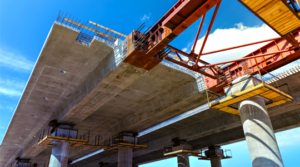
In an industry where long-term concerns rule — from cash flow problems to planning projects years in advance — a plan for the federal government to spend over $1 trillion on infrastructure projects in the next five years should be cause for celebration. For the moment, however, it’s just another headache for many in infrastructure.
Though President Biden and his allies are working to get a new infrastructure bill worth trillions passed by the House of Representatives (after it passed in the Senate earlier in 2021), political delays — like an October 28, 2021, decision to table a vote that could pass the bill — are holding it back, and that’s a big problem for people in the construction industry.
Transportation officials around the country who are hoping to deal with the nation’s infrastructure problems are particularly concerned, as the uncertainty surrounding federal funding is keeping organizations from making longer-term plans.
“I think a lot of folks in the transportation industry are in limbo,” said Jim Tymon, executive director of the American Association of State Highway and Transportation Officials (AASHTO).
Though the White House has gathered a wide coalition of support from both Democrats and Republicans, progressive representatives are hoping to postpone the vote until a larger spending bill — around $3.5 trillion that focuses on issues as disparate as climate change and preschool funding — can be discussed.
“It’s incredibly frustrating to those of us in the transportation community to see it get this far and then to see it kind of stall for the last two or three months in the House,” Tymon added. “The fact that Congress hasn’t gotten that done has really hamstrung some state DOTs and transit agencies because they rely on those federal dollars and the predictability of those federal dollars.”
“And that’s changing the approach that a lot of states take and how they put projects out to bid. And as a result, you’ll have less work for contractors to bid on and fewer jobs for construction workers.”
Learn more – Construction Bidding Websites: How They Work — and Which to Use
State and local officials are worried about the impact on construction in their states as well, as so many need the guarantee of federal funding to start — and even plan — infrastructure projects.
“We are heavily reliant on the federal money,” said Bill Panos, Director of Transportation for North Dakota. “It is more than half of our entire transportation budget.”
“So this is, right now, the dawn of our construction season, and in fact, some of the delays in the federal funding, some of the uncertainty has created delays in some of our projects right now. We have pushed off some of our projects.”
Other states are voicing their concerns about long-term planning, as well.
“Valuable resources are expended to change project plans and even program plans due to funding uncertainty,” noted officials from the Minnesota Department of Transportation.
Kentucky’s Transportation Cabinet (KYTC) similarly said that it was facing uncertainty over its future projects due to the holdups. “Over the next four months, KYTC has over a quarter of a billion dollars in projects scheduled for construction lettings,” the agency stated. “Without the certainty of full federal-aid highway funding, many of these projects could be delayed until federal funds are in hand.”
Despite the fact that the political system is holding back the bill’s passage, many individual politicians are voicing support, and there’s optimism among many that the bill is on its way to passage.
“This legislation, the infrastructure bill, directly affects what’s going on with the supply chain. It’s a crisis, and it’s time for us to act,” said Ohio Senator Rob Portman.
“It will fundamentally change the lives of millions of people for the better,” President Biden added. “Let’s get this done.”
Engineers around the country are pushing for the new infrastructure construction amid delays
Transportation and infrastructure officials aren’t the only ones concerned with the lack of movement on the new infrastructure bill: Civil engineers nationwide have been voicing their concern over the state of the nation’s infrastructure and pushing the need for new construction work as part of federal infrastructure spending, hoping that the new bill passes soon.
“Our infrastructure, in general, is not in a midlife crisis; it’s in an old-age crisis,” said Maria Lehman, president-elect of the American Society of Civil Engineers (ASCE). “Most of our infrastructure is old and tired, and was not built for today’s needs.”
“You can’t build a healthy economy on a crumbling infrastructure,” Lehman added.“We’ve had many, many, many decades of taking our infrastructure for granted…And it’s all coming due at the same time.”
The ASCE grades American infrastructure every four years, giving letter grades in 17 categories — but the grades aren’t good, and the data the organization is viewing is underpinning the need for serious construction investment. According to ASCE’s 2021 Report Card for America’s Infrastructure, the United States as a whole scored a “C-” grade. Major individual infrastructure categories received even worse grades, such as roads (“D”), transit (“D-”), and aviation (“D+”).
The ASCE is serious about the possibilities in the new infrastructure bill, however, and sees a great path forward for new construction and project planning.
“…the thing that’s exciting to me is we’ve underfunded research and development for a long time as a country, and so one of the things in the [Infrastructure Investment and Jobs Act] is that there’s $50 billion in resilience projects that make us more climate-resilient,” Lehman added. “So we think about building it back better, making something that’s going to be there…there’s research and development money that is sprinkled in through a lot of the different items—that can [help] come up with what the next great thing is going to be.”